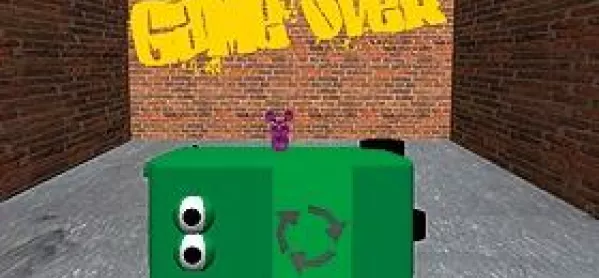Life’s a pitch for the tech tycoons

Wheel-e Bin is a “rubbish” game which has been designed by HNC computer games development students at Reid Kerr College, Paisley - tailored to the demands of their business clients, a P6 class at nearby Lochfield Primary.
It is, in fact, an action game in which the gamer takes on the role of a “wheelie bin” cleaning up the streets before taking on the bad guy, Litter Bug. It’s designed to promote Lochfield’s eco-school programme.
This is one of several eco-concept games that teams of Reid Kerr students are pitching at their primary clients in the hope of being voted the winner. The chosen game, voted for electronically by the pupils, will then be given to the school and used to increase environmental awareness.
This FE-primary sector business partnership is very much about career pathways and enterprise education and is proving highly motivating and rewarding for both pupils and students.
“It’s never too early to start thinking in terms of career pathways,” says Lochfield depute head Marie Renton. “This project not only gets the pupils thinking about studying computer technology or pursuing a career in computer design, it also opens their eyes to the possibilities of further education in general.”
The project has seen the students visiting the school to make their initial “pitch” to their potential clients, and to take on board their comments and ideas. The primary pupils will soon come to the college to test the completed games.
“We have to focus on possible career paths by P6, because this will affect the pupils’ course choices in secondary school,” says Mrs Renton. “What’s been very encouraging has been the interest in college courses and questions about college life the children have raised.
“The project itself is rooted in CfE. It helps make the pupils successful learners and confident individuals, as their opinions and decisions really matter to the outcome of the project. As they have to give advice to the older students, this also makes them effective contributors, while the eco-friendly nature of the game reinforces the idea of responsible citizenship,” she says.
For the Reid Kerr students, the project functions as a real-life experience where they have to pitch to clients, become involved with them in market research, take on board suggestions and required changes, and hopefully gain final approval for their design.
“We’re used to working on our own games, but this gives you more of a feeling for what the industry is like,” says HNC student Stephen Festorazi.
“You have to develop team-working skills, learn to take on board the changes the client wants, discuss ideas and developments and move forward together. We are learning a lot of life skills, of soft skills, as well as improving our design skills - it’s a real preparation for the industry,” he says.
Gaming is a big industry and it’s crying out for people with the right skills.
“Famous games like Grand Theft Auto, though they sound American, are actually Scottish and it’s a real growth industry,” says computer lecturer David Renton.
“We want our students to succeed in the industry if that’s their chosen path. But games programming helps develop your employability much more widely, because games programming is more difficult than normal programming, involving a lot more maths and physics.
“For example, in designing a projectile game or a racing game you need to employ real-world maths and physics if you want the end product to be realistic,” he says.
For both college and school, the partnership is clearly more than a game. It’s about the serious business of career development and employability skills. But it’s also fun. As one pupil described the first consultation meeting with the students: “This has been the best day ever in P6!”
`Pupils were enthusiastic as well as daunting’ “This is a real-life project. Pitching for the first time to a class of P6 pupils was nothing if not nerve-wracking,” says Scott Sutherland, HNC computer games student and Wheel-e Bin team leader. “It was enjoyable, yes, but also stressful. They very much had their say after our PowerPoint presentation. “They liked our concept but they wanted a bonus game added, which we had to go away and design, and we really are trying to make it the best we can. “They thought our initial design of the Wheel-e Bin character, which had big bushy eye-brows, was too angry looking. They wanted him to be friendlier looking. That was a lesson learnt. “It was like a job interview and getting through it was a boost to our confidence, because the pupils were so enthusiastic as well as daunting. “Our shared motivation and team-working skills have developed a lot and as team leader I’ve had to learn to delegate. “Through the project, and through the course in general, I’ve also learnt a lot about education. I’ve worked in lots of jobs, like bar work, before coming to college. I now find I’ve been helping other students with their work, being that wee bit older. Last year when I’d finished my coursework early, I decided to help some other students - there were about 14 of them - to complete their coursework and I got a real sense of achievement. “What I’ve come to realise is that after going on to university, I’d like to lecture in computing, specialising in games.”
Keep reading for just £1 per month
You've reached your limit of free articles this month. Subscribe for £1 per month for three months and get:
- Unlimited access to all Tes magazine content
- Exclusive subscriber-only stories
- Award-winning email newsletters
